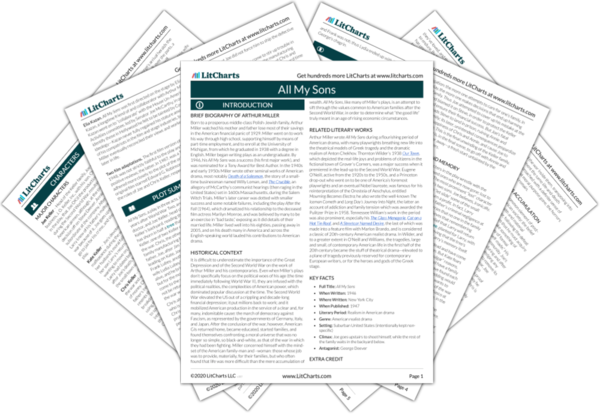Family and Familial Obligation
Nearly all the characters in the play are concerned with the establishment and maintenance of family life. Joe Keller is the “head” of the Kellers: he has run a successful manufacturing business both during and after the Second World War. Joe cares primarily about the happiness of his wife Kate and his son Chris, who works with him in the family business. Larry, another son, was lost in a plane crash during the…
read analysis of Family and Familial ObligationLoss and Memory
Many characters in the play wrestle with the memory of loved ones who are now gone: lost to them or dead. The most prominent “lost” character is Larry, one of Joe and Kate’s two sons. Joe believes, ironically, that Larry was more willing to “let slide” some of the small things that help a business to turn a profit. In fact, Larry committed suicide because of his father’s criminal negligence at the factory. Kate…
read analysis of Loss and MemoryWar, Morality, and Consequences
The Second World War is not just the immediate worldwide precursor to the play; it is inseparable from its action. Specifically, the war resulted in the death of Larry and caused the kind of difficult choices that forced Joe and Steve into their fateful decision to allow the production of cracked parts for American planes. But the war also provided Larry, Chris, and other American soldiers a clear set of black-and-white moral choices: democracy…
read analysis of War, Morality, and Consequences
Wealth and Its Accumulation
The play dramatizes a common element of post-Second World War American society: the belief that the acquisition of wealth and material possessions was part of American power, following the defeat of fascism in Europe and Asia. Joe believes that he must acquire wealth in order to please his family and make something of himself in the world. He has very little by way of formal education, and therefore considers himself “self-made.” His shrewdness in business…
read analysis of Wealth and Its AccumulationLiability, Culpability, and Guilt
Finally, and perhaps most importantly, the play attempts to parse who is guilty for Larry’s death, Steve’s incarceration, and the deaths of the 21 airmen whose planes fell out of the sky. The tracing of these lines of guilt runs throughout the drama.
At first, it appears to everyone, except Annie, that Larry’s death was an accident, or that he was shot down in battle. But Annie finally reveals that Larry chose to commit…
read analysis of Liability, Culpability, and Guilt











